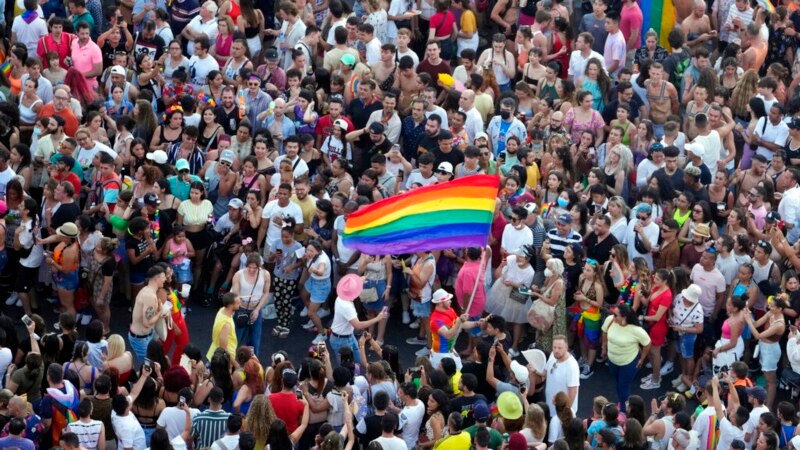
Hundreds of thousands of people waved rainbow flags and danced to music at Madrid’s Pride march Saturday as the event returned following two years of COVID-enforced restrictions.
Across Europe, in Romania, an estimated 15,000 took to the streets of Bucharest to demand equal rights for gender and sexual minorities, under the heavy supervision of police.
Romania decriminalized homosexuality in 2001, but same-sex couples are not allowed to marry or enter into civil partnerships.
Demonstrators in the Spanish capital gathered in the late afternoon behind a large banner with the slogan “visibility, pride and resilience.”
Some participants carried water pistols and sprayed each other to keep cool in the searing heat. Others went bare-chested and danced to the rhythm of Brazilian and techno music.
Several ministers from Spain’s left-wing coalition government, including Interior Minister Fernando Grande-Marlaska, joined them.
“I missed this a lot. The atmosphere is great. You can see that people really wanted to party after so long without a ‘normal’ Pride,” said Victor Romero Fernandez, a 38-year-old teacher.
City authorities said more than 600,000 people took part in the event, which public broadcaster TVE covered live for the first time.
Civil servant Miguel Angel Alfonso, 44, appreciated seeing packed streets but thought the event should put more emphasis on demanding rights.
“It has become a big party, with floats converted into discos and multinationals … it’s a big business,” he said.
Homosexuality was decriminalized in Spain in 1978, three years after the death of dictator Francisco Franco. The country has since legalized marriage and adoption for same-sex couples.
In Bucharest, activists are worried about a draft law, put forward by lawmakers from Romania’s Hungarian minority, to prohibit educational material that discusses homosexuality and gender transition in schools.
The senate earlier this year passed the bill, though it still has to be put to a vote in the lower house.
The proposal is similar to legislation that came into force last year in neighboring Hungary.
Among the crowd, 37-year-old Catalin Enescu had come with his wife and two young daughters, both dressed in rainbow-colored dresses.
“It’s my first time taking part in a march like this, but it’s important to be here because the rights of LGBTQ people are no longer respected,” he said.
Earlier in the day, about 200 people, several brandishing Orthodox Christian icons, responded to a call by far-right party Noua Dreapta for a counter-protest.
“The fact that pride celebrations are bigger and bigger while right-wing groups are smaller and smaller is a positive sign,” said Tor-Hugne Olsen, of the International Planned Parenthood Federation.
“But it’s challenging that we see many proposals in parliament that are reducing the rights of the LGBT and other sexual health issues.”
Oana Baluta, another protester and a professor at the University of Bucharest, said she feared what would happen if the bill were passed into law in the EU country.
“If it is adopted, this draft law — which is contrary to European Union norms — would deal a grave blow to the freedom of expression and rights of LGBTQ people,” she said.
“It would set a dangerous precedent, because we would then risk also being banned from the right to discuss abortion and sexual education,” she said.
Romania has one of the highest rates of teenage pregnancies in Europe. Abortions are legal, but access to them has become increasingly difficult.
